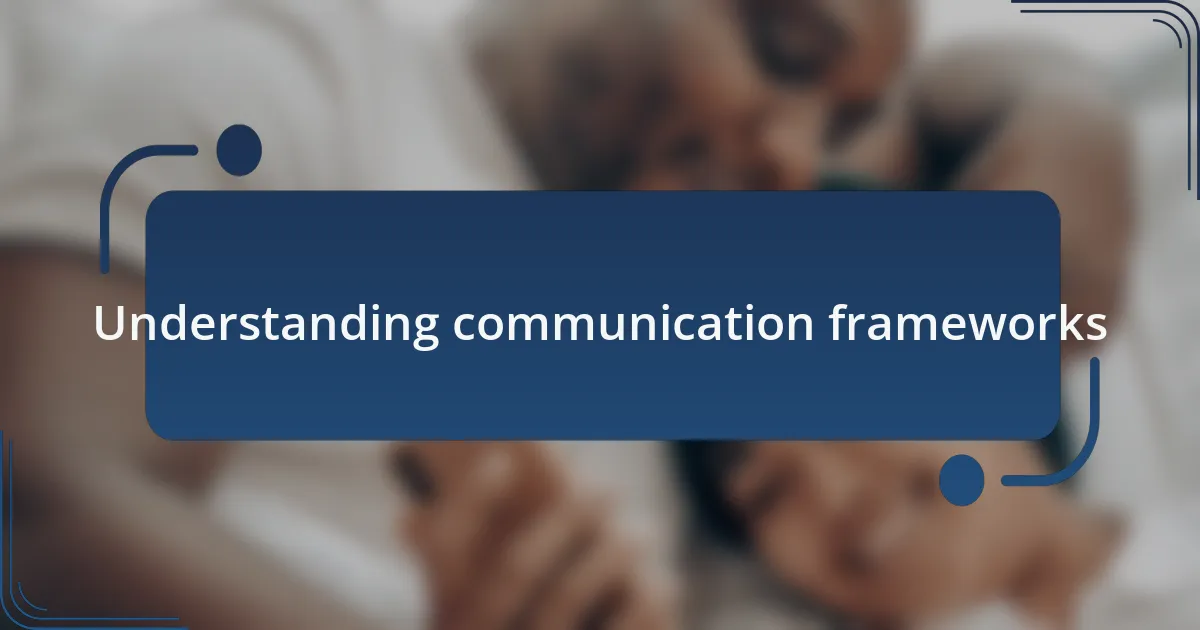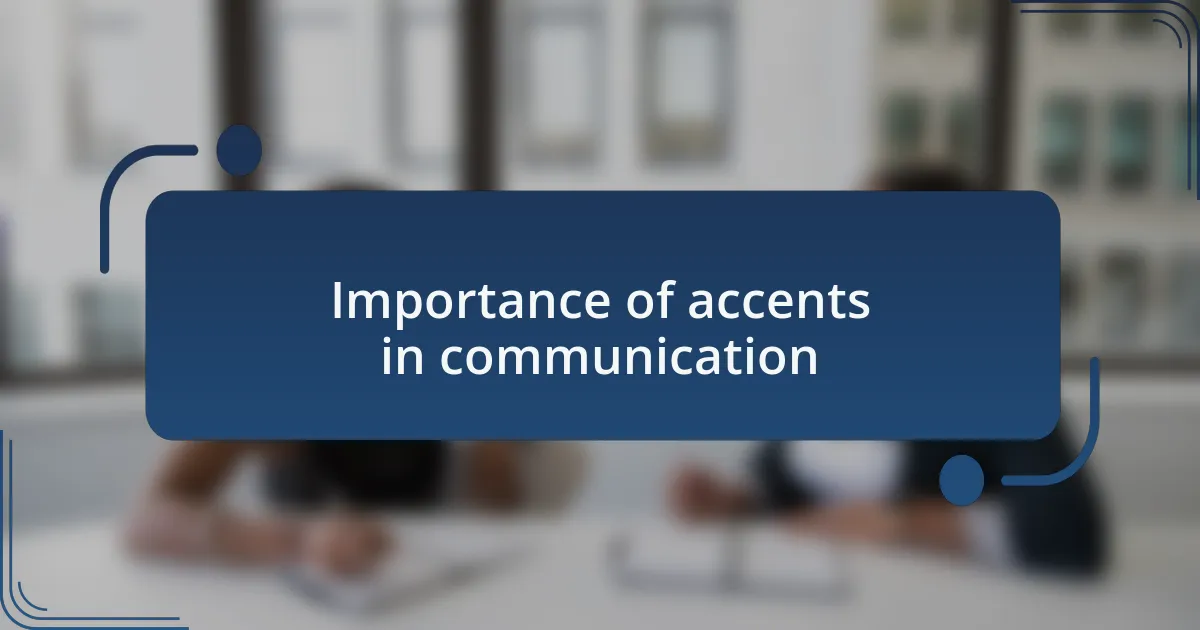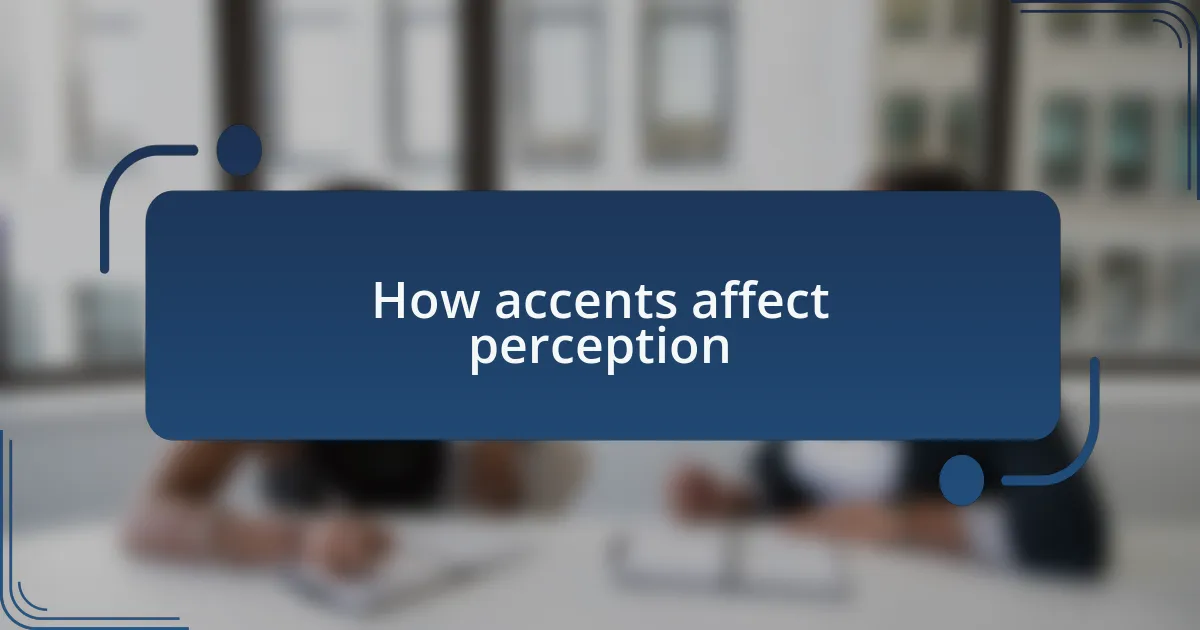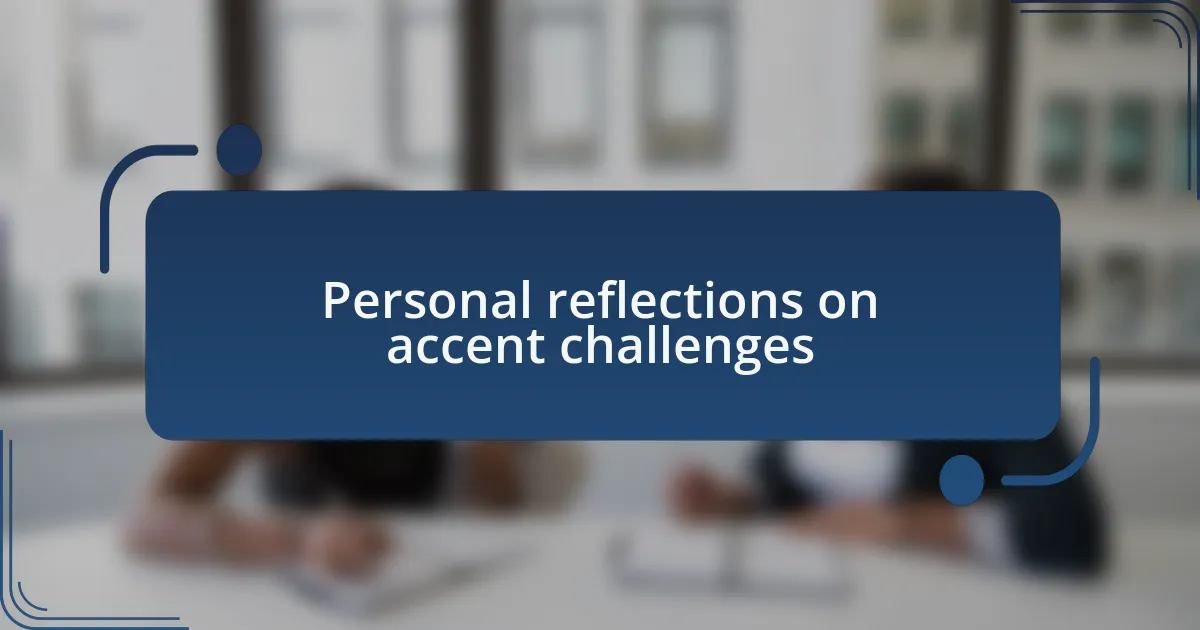Key takeaways:
- Communication frameworks encompass context, sender, receiver, and feedback, which are essential for effective dialogue.
- Accents convey background and identity, impacting perceptions, biases, and emotional connections in conversations.
- Active listening and engaging with diverse speakers can significantly enhance accent comprehension and foster deeper connections.
- Empathy, adaptability, and vulnerability are key to navigating communication challenges and enriching interpersonal exchanges.

Understanding communication frameworks
Communication frameworks serve as the backbone of effective dialogue, shaping how we convey and interpret messages. When I first explored these frameworks, I realized they aren’t just theoretical models; they reflect real-life interactions filled with nuance and emotional subtext. What if we could harness these frameworks to enhance our daily conversations?
One aspect that truly struck me was how different components – context, sender, receiver, and feedback – all play crucial roles in how communication unfolds. I remember a time when I misinterpreted a friend’s tone due to the context of our conversation, leading to unnecessary tension. Have you ever found yourself in a similar situation, where the surrounding circumstances turned a simple chat into a misunderstanding?
As I delved deeper, I began to appreciate the layers within each framework, particularly the cultural influences that shape communication styles. For instance, I’ve found that accents not only carry geographical identity but also reflect subtle emotional cues. It’s fascinating to consider how understanding these nuances can lead to more empathetic interactions. How do you think we could enrich our conversations by recognizing these underlying layers?

Importance of accents in communication
Accents play a significant role in communication, as they can convey a person’s background and identity almost instantly. I recall a moment when I met someone from a different part of the country, and their unique accent sparked a conversation about our respective hometowns. It was surprising how quickly we connected through shared experiences, highlighting how accents can serve as bridges, fostering relationships across diverse backgrounds.
Understanding accents goes beyond mere recognition; it involves interpreting the emotional layers that accompany them. There was an instance when I misjudged someone’s eagerness in a discussion because I didn’t fully grasp the importance of their accent. This taught me how critical it is to listen actively and discern the emotions tied to varying speech patterns, which can significantly affect how a message is received.
Additionally, accents often shape first impressions, sometimes leading to implicit biases or assumptions. Have you ever noticed how you might respond differently depending on someone’s accent? From my experience, acknowledging these biases can lead to more open and enriching exchanges. Realizing the impact of accents has compelled me to approach conversations with curiosity and respect, allowing for deeper connections.

How accents affect perception
Accents can significantly shape our perceptions of a speaker’s credibility and authority. I remember attending a conference where a presenter spoke with a thick regional accent. Initially, I found myself hesitating to accept their insights, mistakenly believing their accent detracted from their expertise. This experience pushed me to reflect on how I often allow accents to cloud my judgment, rather than focusing on the content of the message itself.
There’s something fascinating about how we frequently associate particular accents with certain traits. For instance, I often find myself drawn to the warmth of a Southern drawl, feeling an immediate sense of trust and friendliness. However, I also recognize that this can lead to my own biases, as I might unconsciously judge someone with a different accent, thinking they might be less friendly or approachable. Isn’t it interesting how these impressions are often more about our preconceptions than the individuals themselves?
Moreover, accents can carry emotional weight that can enrich or complicate communication. There was a time when I spoke with a colleague who had a pronounced accent from their native country. Their expression became more animated as they recounted a meaningful story from their childhood. In that moment, their accent transformed from a barrier into a vessel of culture and emotion, deepening my appreciation for their unique perspective. Have you ever felt that shift when someone shares a part of themselves through their accent? Those moments remind me how important it is to embrace the differences we encounter in each conversation.

My initial experiences with accents
My initial encounters with accents were eye-opening. I vividly recall my first day at university, where I met students from various backgrounds. As I listened to their diverse accents, I felt both excitement and apprehension. It made me wonder about my own accent and how it would be perceived by others. Did my speech fit in, or did it set me apart?
One particularly memorable interaction was with a fellow student from England. Their crisp, articulate tone was refreshing yet intimidating. I found myself hanging onto their every word, captivated by how differently they expressed themselves compared to my own more casual speech. It struck me how this encounter challenged my understanding of how an accent could enhance someone’s storytelling ability. Was it just me, or could accents truly carry a certain magic?
Thinking back to those early experiences, I recognize they sparked a curiosity within me. I became keenly aware of the nuances in how accents conveyed emotions and stories. I remember engaging with friends from different parts of the world, often asking them about the origins of their accents. Each conversation revealed layers of culture and identity, leaving me with a profound appreciation for what lies behind the way we speak. Have you ever thought about how much learning happens when we listen to someone share their unique voice? It’s a journey well worth taking.

Strategies for improving accent comprehension
One effective strategy for improving accent comprehension is actively listening to diverse media. I recall tuning into podcasts that featured speakers from various regions, allowing me to immerse myself in different accents throughout my daily routine. Have you ever noticed how repetition in listening can gradually bridge the gap of unfamiliarity? I found that the more I exposed myself to diverse accents, the more my ears adjusted, making it easier to understand the subtleties of pronunciation and rhythm.
Another approach I embraced was engaging in conversations with individuals who spoke with different accents. I vividly remember chatting with a friend from South Africa, whose unique intonations offered a fresh perspective on familiar words. During our discussions, I often asked questions for clarification, not just to understand better but to show my interest. This not only boosted my confidence but also made my friend more enthusiastic about sharing their language nuances. Don’t you think this exchange deepened both our understandings of each other’s experiences?
Lastly, practicing mimicking different accents was a fun and revealing exercise for me. I experimented with capturing the accents of my favorite film characters, which challenged me to pay close attention to vowel sounds and shifts in tone. I found that when I mimicked these accents, I not only improved my comprehension but also developed a greater appreciation for the artistry behind each style of speech. Have you considered how embodying an accent could enhance your listening skills while making the learning process enjoyable? It has been a transformative part of my journey.

Personal reflections on accent challenges
I’ve navigated the intricate web of accents, often stumbling over words that felt foreign. There was one instance during a business meeting where I misinterpreted a colleague’s request due to his thick Scottish accent. That moment of confusion felt like a heavy weight, making me realize how accents could create barriers even in familiar environments. Have you ever found yourself lost in translation in a similar situation?
Reflecting on these challenges, I often ponder how accents not only affect communication but also shape identities. I remember a lively dinner conversation with friends who hailed from different parts of the world. Their accents echoed their unique backgrounds, creating an atmosphere rich with cultural texture. It made me acutely aware: when I struggled to understand, I wasn’t just grappling with speech; I was missing out on a piece of their story. Does recognizing this aspect change how you perceive your interactions?
Moreover, I’ve faced moments of frustration while trying to adjust my own accent for clarity. During a language exchange, I deliberately altered my pronunciation to match my partner’s style, hoping to find common ground. Yet, I felt a sense of loss, as if a part of my identity was left behind. Isn’t it interesting how striving for clarity can sometimes lead us to question who we are in the world of language?

Lessons learned from my journey
Reflecting on my journey with accents, one key lesson stands out: empathy is crucial. During a chat with a friend who spoke with a strong regional accent, I found myself trying hard to tune in rather than just get frustrated. Understanding the effort they put into communicating made me realize that patience can transform a challenging conversation into a meaningful exchange. Have you ever had a moment where listening deeply shifted your perspective?
Another important takeaway has been the value of adaptability. I remember attending a workshop where participants came from various linguistic backgrounds, each bringing their distinct accents. Rather than feeling overwhelmed, I embraced the differences, allowing myself to practice and learn from them. This experience taught me that flexibility in communication can turn potential awkwardness into a rich tapestry of dialogue. How do you approach conversations when faced with diverse accents?
Finally, I learned that embracing vulnerability can lead to profound connections. In one instance, I candidly shared my struggles with understanding different accents during a group discussion. To my surprise, others reciprocated, sharing their own challenges. This openness not only fostered a sense of community but also created an atmosphere where everyone felt safe to express themselves. I wonder how often we miss deeper connections simply because we don’t allow ourselves to be vulnerable.